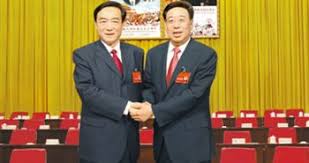The top Chinese Communist Party official in the Tibet Autonomous Region has asked party officials to win the “tough battle against separatism” and “profoundly expose and criticize the reactionary nature” of the Dalai Lama and his supporters.
Wu Yingjie, secretary of the TAR Party Committee, made the remarks at a meeting of the TAR Party Committee’s National Security Committee, according a Chinese state media report. The report does not specify when this meeting took place.
Directing officials to launch a propaganda campaign, Wu stressed that they should “educate and guide the people of all ethnic groups to thank the party for its kindness, listen to the party, and follow the party.”
In a clear admission of Tibetans’ continued loyalty to the Dalai Lama, Wu said, “We must make people consciously draw a clear line with the 14th Dalai and Dalai Clique, maintain a clear-cut stand for the unification of the motherland and strengthen national unity.”

Wu Yingjie and Chen Quanguo
Religious freedom violations
Wu also directed the officials to thwart the Tibetan monastic community’s devotion to the Dalai Lama.
Instructing the officials to manage the religious community, Wu said, “We must consolidate the responsibility of monks and nuns and representatives of religious circles to maintain the stability of their monasteries, and implement various management measures to ensure harmony and stability in the religious field.”
He reiterated the policy of the “Sinicization” of religions—which seeks to bring religions under the control of the Communist Party—and urged the officials to eradicate the Tibetan people’s loyalty to the Dalai Lama.
Wu said there should be a “clear-cut stand to eliminate the negative influence of the 14th Dalai Lama’s use of religion, and guide the religious believers to treat religion rationally, downplay the negative influence of religion, and live a happy life for this lifetime.”
Dalai Lama succession
Wu’s latest utterances reflect the Chinese authorities’ frustration at their lack of legitimacy among Tibetans. Despite continued propaganda and efforts at “patriotic re-education,” loyalty to the Dalai Lama among Tibetans remains firm.
The attempt to discredit the Dalai Lama might also be linked to his clear stance, in line with the universal principle of religious freedom, that only he has authority over his reincarnation.
Irrespective of China’s claim that it will select his eventual successor, the Dalai Lama’s authority over that process is accepted by Tibetans, as well as by the international community and followers of Tibetan Buddhism worldwide.
CCP discredited
Wu’s remarks also highlighted the uneasiness of the Chinese government at a moment of greater international tensions for China, which is facing increasing criticism over its lack of respect for basic democratic and rule of law norms.
Wu stated that the struggle will be a difficult one, that they should expect the “situation to be more complicated” and the “risks and challenges to be more severely,” and that there will be “hidden dangers.”
He asked the officials to “be prepared for danger in times of peace, and repair the house before it rains.”
The TAR National Security Committee meeting was preceded by the visit of Wang Yang—China’s top political leader—to the region last month, as well as the visit by Wang Yi—China’s top diplomat—this month.
A central Foreign Affairs Committee of the Chinese People’s Political Consultative Conference also visited the TAR last week, and a TAR Party Foreign Affairs Committee held its meeting in the eastern Tibet city of Chamdo in June this year.

